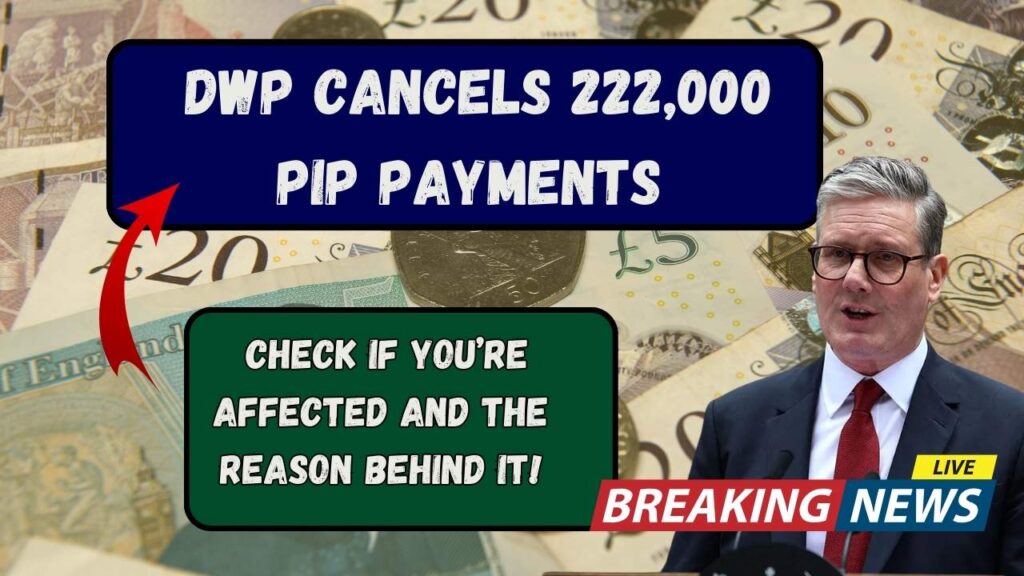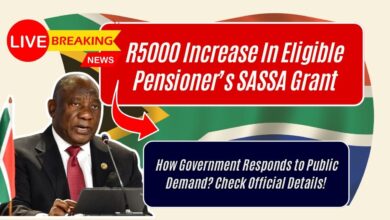DWP Cancels 222,000 PIP Payments — Check If You’re Affected and The Reason Behind it!
DWP Cancels 222,000 PIP Payments – The Department for Work and Pensions (DWP) has dropped a bombshell — cancelling 222,000 Personal Independence Payments (PIP) across the UK. If you’re one of the millions relying on PIP to manage your life with a disability or long-term health condition, this update might have you seriously worried.

In this article, we’ll explain what happened, who’s affected, and what steps you can take if your payments were stopped. From real-life examples to actionable advice, we’ve got your back.
DWP Cancels 222,000 PIP Payments
| Topic | Details |
|---|---|
| Affected Payments | 222,000 PIP claims reviewed and cancelled |
| Reasons for Cancellation | Missed review forms, condition improvement, suspected fraud, fixed-term expiry |
| Regions Affected | All UK areas under DWP |
| Who’s Most at Risk? | Claimants who missed reviews, medical assessments, or had improved conditions |
| What To Do If Affected | Request reconsideration, gather evidence, file a new claim, appeal if needed |
| Official Source | DWP – GOV.UK |
The DWP’s cancellation of 222,000 PIP payments has left thousands in a state of confusion and distress. If you or a loved one has been affected, it’s essential to act quickly — check your status, appeal the decision, and seek support from professionals or charities.
What Is PIP and Why It Matters
Personal Independence Payment (PIP) is a benefit that helps people with long-term health conditions or disabilities deal with extra costs. It’s non-means-tested, which means your income doesn’t affect whether you can get it. You’re eligible if you’re between 16 and the State Pension age and need help with daily living or mobility.
But here’s the catch — PIP isn’t guaranteed forever. It’s regularly reviewed, and if the DWP thinks you don’t meet the criteria anymore, your payments can be stopped.
Why Did the DWP Cancel 222,000 PIP Payments?
According to a report from Yahoo News UK, the DWP stopped these payments for a range of reasons, many of which could affect thousands more. Here’s what you need to know.
1. Not Returning PIP Review Forms
One of the top reasons people lost PIP is because they didn’t return their review form. If you miss the deadline or never receive it in the mail, DWP may assume you no longer need support. Unfortunately, that means your payments get cut off — sometimes without warning.
2. Medical Reassessments Indicated Improvement
If you’ve gone through a PIP reassessment and the medical professional believes your condition has improved, the DWP may decide to reduce or stop your payments. Even small changes in how you describe your daily challenges can affect the decision.
3. End of Fixed-Term Awards
PIP is often awarded for a fixed period — like two or three years. When the term ends, DWP expects you to reapply or go through a new review. If you didn’t act in time, your payments may have expired automatically.
4. Missed Medical Assessments
If you missed a scheduled medical appointment without a good reason, the DWP can stop your benefits. This applies even if you had anxiety or trouble traveling — unless it was officially communicated to them.
5. Overpayments and Fraud Allegations
If the DWP believes you’ve been overpaid, they might stop your payments and demand repayment. In more serious cases, they may suspect fraud and halt your benefits while investigating.
6. Immigration or Residency Changes
Changes in immigration status or residency — like moving abroad or visa issues — can make you ineligible for PIP. If you’re not meeting the residency requirements, the DWP might stop your claim.
How To Check If You’re Affected?
If you’re receiving PIP, here’s how to check whether your payments were stopped:
- Look out for letters or texts from the DWP
- Log in to your account on gov.uk
- Contact the PIP helpline at 0800 121 4433
- Check your bank account to confirm recent deposits
- Talk to your support worker or GP to see if they’ve been contacted by DWP
What To Do If Your PIP Payments Were Stopped?
If your payments have been cancelled, don’t panic. There are ways to challenge the decision and potentially get your benefits reinstated.
Step 1: Request a Mandatory Reconsideration
This is your first step if you think the DWP made a mistake. You’ll need to:
- Write or call to ask for a reconsideration within one month of the decision
- Explain why the decision is wrong and include as much detail as possible
- Send in supporting evidence, such as medical letters, prescription history, or daily care notes
Step 2: Gather Medical Evidence
Strong documentation is key to winning a reconsideration or appeal. Gather:
- GP letters
- Specialist reports
- Hospital discharge summaries
- Mental health records
- Statements from carers or family members
The more proof you have, the stronger your case.
Step 3: Submit a New PIP Claim
If your reconsideration is denied, or if you missed the appeal window, you can still submit a brand-new claim. Many people find this route faster and easier than navigating a long appeals process.
Step 4: Appeal to a Tribunal
If your reconsideration doesn’t change the outcome, you can take it to an independent tribunal. This is a legal process, but many people win their appeal — especially if they come prepared with evidence and advocacy support.
For free support, contact:
- Citizens Advice
- Scope
- Disability Rights UK
Why This Decision Matters?
Cutting 222,000 PIP payments isn’t just a policy change — it’s a life-changing disruption for thousands of people. For many, this benefit is the only way they can afford food, heating, transportation, or care.
Without it, the cost of living becomes unbearable. Many people are already on edge financially, and removing this support pushes them closer to crisis.
That’s why it’s critical to understand your rights, take action, and get support if you’re affected.
DWP Benefit Changes in May: Will You Get a Double Payment or Lose Out?
DWP’s Cost of Living Support Returns — Here’s How to Secure Your Payment
State Pension Bombshell: DWP to Roll Out Two Major Changes This May!
FAQs About DWP Cancels 222,000 PIP Payments
Q1. How do I know if my PIP is cancelled?
You should receive a letter from the DWP. If not, check your account online or call the PIP helpline.
Q2. Can I still get PIP if I have a job?
Yes. PIP is not means-tested, so employment doesn’t affect eligibility.
Q3. What if I missed the review form deadline?
Contact DWP immediately. They may allow late submissions in exceptional cases.
Q4. How long does a reconsideration take?
It usually takes 2 to 6 weeks, depending on case complexity.
Q5. Can I get backpay if I win my appeal?
Yes. If your payments were wrongfully stopped, you’ll receive payments backdated to the original cancellation date.







